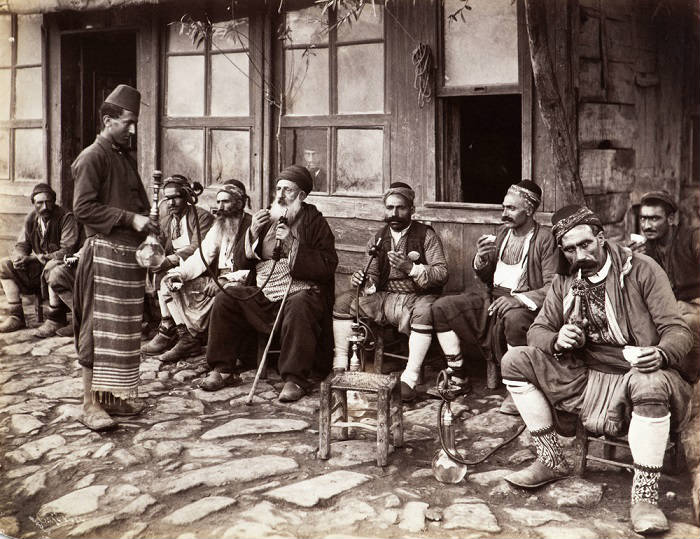Europe and the Middle East have a long history of distrust, argues former Prime Minister John Bruton.
I have just finished reading A Line in the Sand: Britain, France and the Struggle That Shaped the Middle East by James Barr. The book deals with relations between France, Britain and the Muslim world, a topic that has become tragically topical over recent weeks.
France and Britain were allies in World War I, but they were also bitter rivals when it came to dividing up spheres of influence in the hoped for break-up of the Ottoman Empire — something both nations correctly anticipated would be a result of an allied victory in the conflict. The wishes of the local population, whether they were Muslim, Christian or Jewish, were not considered to be a deciding factor at all. At most, they had to be “managed.”
While the First World War was still raging on, France and Britain drew up the famous Sykes-Picot Agreement in 1916, which allocated present-day Syria and Lebanon to France and gave Britain an area stretching from present-day Israel, through Jordan, to Iraq.
Britain wanted its chosen area, particularly Palestine, as a shield for the Suez Canal — a vital link to British India. It also wanted access to oil in present-day Iraq. France wanted access to the same oil and saw itself as a protector of Christian interests in Syria and Lebanon. The crucial question was territory rather than people.
But the British also wanted Arab support to defeat the Turks, so they promised to back an independent Arab state of Greater Syria, which included areas they had agreed could be under France’s influence, and thus was in conflict with their agreement with the French.
Furthermore, Britain wanted Jewish support in the United States to push the Americans to help the British war effort. In pursuit of the latter goal, the Brits agreed in 1917 to a “homeland” for Jews in Palestine — known as the Balfour Declaration. This, of course, ran completely counter to Arab interests and eventually led to the present State of Israel on formerly Arab lands. Again, the views of the local inhabitants counted for little.
These contradictory promises, made in desperate efforts to win the war, were to poison relations between all the parties for decades to come. They lie behind the violent distrust that was manifest in the vile murders in Paris from January 7-9.
Following the end of World War I, when France and Britain came to occupy their respective lands under the Sykes-Picot Agreement, with the backing of a League of Nations mandate, they each faced revolts from the local populations. But there was no “European solidarity.” The Anglo-French rivalry was such that they each gave support to the other side’s rebels.
This rivalry continued into World War II, and Barr argues that British support for the ejection of France from Syria in 1944-45 so poisoned Charles de Gaulle’s relations with Britain that it contributed to his vetoing of British membership of the Common Market 20 years later.
France also gave strong initial support to the Zionist resistance to continued British presence in Palestine in 1947-48, in revenge for the support the Brits had given to the ouster of France from Syria in 1945.
As we can see in the Middle East today, and also in Bosnia, we have yet to escape the consequences of the break-up of the multiethnic Ottoman Empire and the ignorant response of European nations to this event. Because the Ottoman Empire had fallen behind materially, it was wrongly and patronisingly assumed to have had no valid lessons to teach about how to manage the intermingled ethnic and religious populations of the Middle East.
The Ottoman system of government, while discriminatory, enabled populations of different ethnicities to share the same cities and villages, as they did in many parts of both the Middle East and the Balkans under Ottoman rule. This Ottoman model of qualified tolerance was bound to come under pressure once Ottoman power was removed and free rein was given to the view that “self determination” for a single predominant ethnicity or “nation” was the natural order of things — a view that became fashionable during and after the First World War in the West.
Barr’s book shows how selfish and ill-informed European interventions of 1916-50 cast a dark shadow today.
Fair Observer is a nonprofit organization dedicated to informing and educating global citizens about the critical issues of our time. Please donate to keep us going.
The views expressed in this article are the author’s own and do not necessarily reflect Fair Observer’s editorial policy.
Photo Credit: Rolleiflex / Shutterstock.com
2 comments
Leave a comment
You must be logged in to post a comment.
Support Fair Observer
We rely on your support for our independence, diversity and quality.
For more than 10 years, Fair Observer has been free, fair and independent. No billionaire owns us, no advertisers control us. We are a reader-supported nonprofit. Unlike many other publications, we keep our content free for readers regardless of where they live or whether they can afford to pay. We have no paywalls and no ads.
In the post-truth era of fake news, echo chambers and filter bubbles, we publish a plurality of perspectives from around the world. Anyone can publish with us, but everyone goes through a rigorous editorial process. So, you get fact-checked, well-reasoned content instead of noise.
We publish 2,500+ voices from 90+ countries. We also conduct education and training programs
on subjects ranging from digital media and journalism to writing and critical thinking. This
doesn’t come cheap. Servers, editors, trainers and web developers cost
money.
Please consider supporting us on a regular basis as a recurring donor or a
sustaining member.
Will you support FO’s journalism?
We rely on your support for our independence, diversity and quality.








Pam Clark
March 19, 2015
True to some extent, but not unbiased. Previous history testifies.
Hugh
January 21, 2015
A world of intrigue, dictators, murder, and strife................long before Europe intruded. While it is true that the western powers shaped the nations of the Middle East, and the Persian Gulf, they can hardly be blamed for the ignorance, the hatred, the violence, the corruption, or the anachronistic religious culture, that thrives there. Not a single functioning democracy in all of the Arab world. Not a one can boast religious, or cultural, freedom. The Muslim/Arab world has been at odds with the rest of the world for 1400 years. To blame their ills on colonial era powers, is just blatant ignorance.